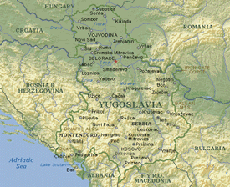When is official control of the press necessary? Never, say U.S press freedom advocates. But in Kosovo, many local journalists support a new regulatory board designed to censor hate speech.
 Pristina — As a vengeful Albanian majority takes over institutions once controlled by minority Serbs, the international authorities who now rule Kosovo want the power to stop Albanian journalists from inciting ethnic violence against the province’s dwindling Serb population. Pristina — As a vengeful Albanian majority takes over institutions once controlled by minority Serbs, the international authorities who now rule Kosovo want the power to stop Albanian journalists from inciting ethnic violence against the province’s dwindling Serb population.
Though Kosovo remains a province of the Federal Republic of Yugoslavia, it has been governed by NATO and the United Nations since June, when Yugoslav army and Serbian paramilitary forces withdrew in the face of NATO’s bombing campaign. Kosovar Serbs have since faced almost daily revenge attacks, which have continued despite the presence of the international peacekeeping force (KFOR). NATO and U.N. officials believe that Kosovo’s history of ethnic violence demands a formal mechanism to regulate hate speech. As a result the Organization for Security and Cooperation in Europe (OSCE), which operates in Kosovo under U.N. authority, recently established a new Media Policy Board. Its function is to advise the OSCE, which retains final authority to regulate the press. The seven-member board features one Serb, the leader of a Serbian political party called the Serb Movement of Resistance. TK WHAT’s THAT. The Albanian contingent includes human rights activists, intellectuals, journalists, and one former member of the Yugoslav communist party. Frank Smyth, a freelance journalist, is a former elected officer of the El Salvador Press Corp Association. He writes regularly for IntellectualCapital.com and contributed to the volume Crimes of War: What the Public Should Know, edited by Roy Gutman and David Rief (www.crimesofwar.org). His website is www.franksmyth.com. |